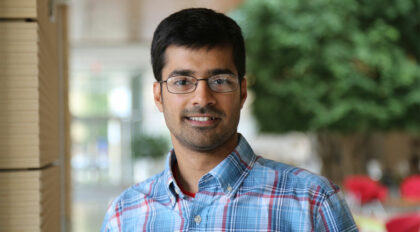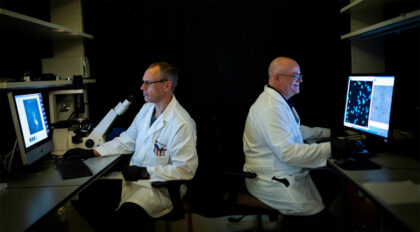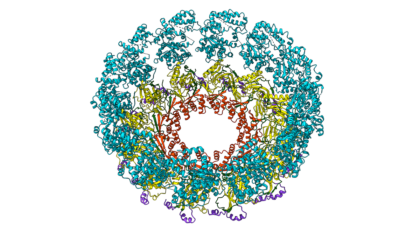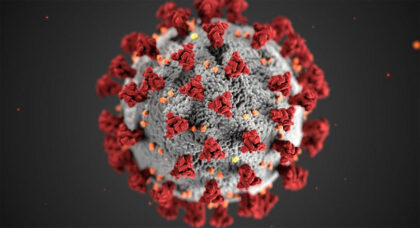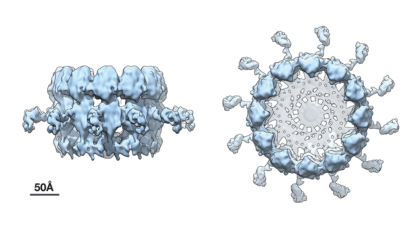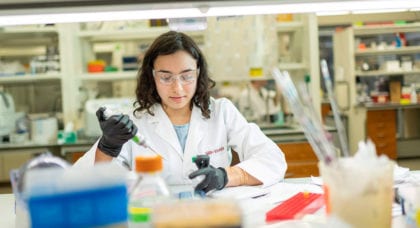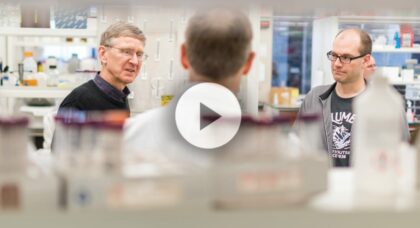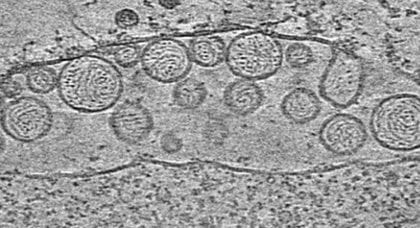Tag: Ahlquist Lab
Postdoc alum joins the fight against Hepatitis B infection
Nuruddin Unchwaniwala, a postdoctoral alumnus of the Ahlquist Lab, joined the biotech industry to help fight Hepatitis B infection, a leading cause of liver cancer.
Researchers illuminate HIV in cell-to-cell attack mode
When cells infected with HIV make contact with uninfected cells, a new study reveals how that connection unleashes a hornet’s nest of activity that helps drive transmission.
Viral Copy Machine Revealed
via College of Agricultural and Life Sciences
GROW Magazine, a research publication for the UW–Madison College of Agricultural and Life Sciences, highlighted the research of Morgridge Investigator Paul Ahlquist on how viruses replicate their genomes within cells.
Stunningly detailed blueprint revealed of viral genome replication machinery
Morgridge virologists have outlined in atomic detail the intricate RNA replication machines that coronaviruses create inside infected cells, giving rise to potential new strategies to fight disease.
Where are they now? Catching up with recent alumni in their new careers
A few of our recent Morgridge alumni reflect on how their research experience at the institute prepared them for their scientific careers.
Giving middle school students a glimpse into the ‘invisible world’ of viruses
A new digital learning resource developed by PBS Wisconsin called “Meet the Lab,” which gives middle school-aged students a glimpse into high-powered research labs and the scientists who run them, highlights the Morgridge Institute virology research team.
COVID-19 Update: Vaccines, viral variants and the path to successful re-opening
The impacts of COVID-19 are improving worldwide. But virology experts argue we must stay vigilant to protect public health for a safer, more productive future.
Keys to a successful COVID-19 vaccine
As health officials move closer to developing safe vaccines against COVID-19, Morgridge virology expert Paul Ahlquist argues for the need for patience and trust during what will be the largest vaccination effort in more than 70 years.
Advanced Cryo-EM reveals viral RNA replication complex structure in stunning detail
For the first time, scientists at the Morgridge Institute for Research have generated near atomic resolution images of a major viral protein complex responsible for replicating the RNA genome of a member of the positive-strand RNA viruses.
Overcoming COVID-19 and future pandemics: new tools to control viral threats
In light of the COVID-19 pandemic, Paul Ahlquist and Tony Gitter joined CEO Brad Schwartz in a webinar where they discussed COVID-19 and the broader context of viral pandemics and how we respond to them.
COVID-19: A wake-up call for the need for new antiviral weapons
Given the death toll and multi-trillion dollar costs of COVID-19, it’s not hyperbole to suggest that an effort on the scale of the Space Race is needed to break the cycle of viral pandemics.
Broad-spectrum approaches could tip the balance against virus threats
In the game against an essentially unlimited pool of virus threats, humanity is seriously outmatched. The Ahlquist Lab is working to develop broad-spectrum antivirals, solutions that will target many viruses at once.
Morgridge Institute announces John W. and Jeanne M. Rowe Center for Research in Virology
The Morgridge Institute for Research is launching the John W. and Jeanne M. Rowe Center for Research in Virology, a new transformative research initiative made possible by the philanthropic support of John and Jeanne Rowe.
Congratulations to our graduating students
With the semester winding down, we are thrilled to congratulate graduating students and research staff who are moving on and up. More than 110 undergraduate and graduate students, in addition to post-doctoral fellows, work across six biomedical research themes at the Morgridge Institute.
An Achilles heel discovered in viruses could fuel new antiviral approaches
Scientists at the Morgridge Institute for Research have discovered a promising new target to fight a class of viruses responsible for health threats such as Zika, polio, dengue, SARS and hepatitis C.
Study Shows HPV Works Across Cellular Borders to Drive Cervical Cancer
via School of Medicine and Public Health
Human papillomavirus (HPV) and the hormone estrogen are both linked to the development of cervical cancers, but how they work together has remained unclear. A new study by University of Wisconsin–Madison researchers shows how the combination of two factors influences the local cervical environment and drives the progression of cancer development.
Morgridge scientists illuminate structures vital to virus replication
In the fight against the viruses that invade everyday life, seeing and understanding the battleground is essential. Scientists at the Morgridge Institute have, for the first time, imaged molecular structures vital to how a major class of viruses replicates within infected cells.
